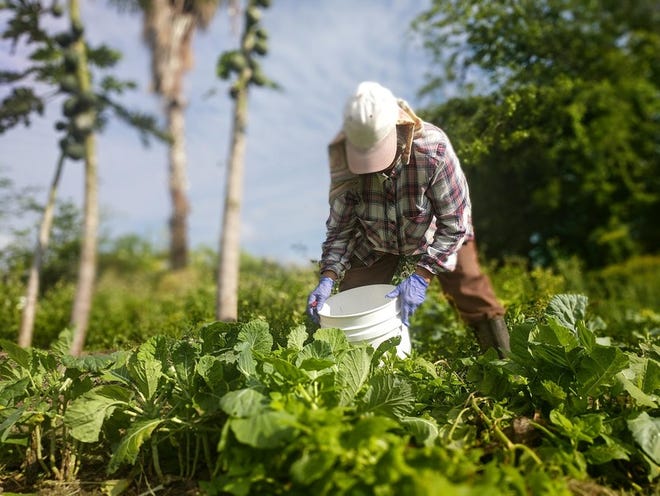
Wisconsin continues to be a frontrunner within the natural farming business. However new information exhibits entry to land and the necessity for extra infrastructure is taking a toll on some sorts of natural operations.
The U.S. Division of Agriculture performed a survey of licensed natural farms throughout the nation in 2021. The survey confirmed that Wisconsin continues to be second within the nation for the whole variety of natural farms with 1,455, up about 6 % from the identical survey in 2019. California continues to guide the business with 3,061 farms, whereas New York got here in third at 1,407 farms.
The survey discovered U.S. farms bought $11.2 billion in licensed natural commodities, a 13 % improve from 2019. Wisconsin had the seventh-highest whole gross sales at $313 million, however was considerably smaller than states like Washington and Pennsylvania, which every had over $1 billion in gross sales, and California, which made up 32 % of whole U.S. gross sales.
Erin Silva, affiliate professor of natural agriculture on the College of Wisconsin-Madison, stated gross sales of natural meals have far outpaced the remainder of the meals sector, particularly vegetables and fruit. She stated lately this development was helped by the COVID-19 pandemic.
“With extra folks consuming at dwelling and doing extra dwelling preparation of meals, and in addition maybe a better emphasis on maintaining a healthy diet to spice up immune methods and attempt to create a extra resilient state towards the virus, we did see a bigger development in natural gross sales than we have now in earlier years,” she stated.
Silva stated provide chain disruptions additionally prompted extra shoppers to attempt to purchase merchandise domestically, boosting assist for Group Supported Agriculture, or CSAs. She stated the business continues to be ready to see how these numbers will modify now that many individuals have returned to consuming at eating places once more.
Lori Stern is govt director of Marbleseed, a company providing schooling and assist for natural farms previously often known as the Midwest Natural and Sustainable Training Service. She stated natural merchandise have grown in recognition as extra shoppers increase questions and considerations concerning the standard meals business.
“An increasing number of shoppers are actually fascinated with connecting to the place their meals comes from, the way it’s grown. There’s clearly big concern about local weather and local weather change. So natural agriculture positively holds the important thing by way of being local weather pleasant, fascinated by agriculture as a system and never making use of chemical compounds” Stern stated.
However not each sector of the natural business in Wisconsin noticed development in 2022.
The variety of farms promoting milk within the state fell by 22 %, going from 525 farms in 2019 to simply 407 farms final yr. That is barely larger than the 20 % decline in whole natural dairy farms within the U.S. throughout these years.
Silva stated that as shopper demand for natural dairy has grown, small and medium-sized farms are feeling the strain of consolidation identical to the traditional dairy business. However she stated she thinks the business can nonetheless be worthwhile for these producers.
“Natural farmers actually should give attention to actually good administration to have the ability to understand the financial advantages that the natural market can deliver,” she stated. “I believe it is simply been rather a lot more durable and there needs to be quite a lot of emphasis on good administration to make a system work.”

Milk from cows nonetheless had the very best whole worth of natural gross sales in Wisconsin at $107 million in gross sales, representing about 7 % of nationwide manufacturing of natural milk.
Fewer farms in Wisconsin additionally reported elevating beef cows and hogs, following nationwide developments. Silva stated these declines might come from excessive costs for livestock feed and the restricted variety of meat processors, which she described as a significant bottleneck for the business.
“Throughout the state it is exhausting to search out processing amenities and once more we noticed that basically come to gentle throughout COVID when that demand was growing. However that is much more of a problem once we’re speaking about promoting that meat as natural, as a result of there’s even fewer amenities which are licensed natural,” she stated.
Silva stated investing in infrastructure like processing and storage amenities is essential for the state’s natural business to proceed to develop.
Stern stated one other barrier for development in Wisconsin and lots of different states is the excessive value of farmland. She stated most of the farmers her group sees getting into the business are younger and infrequently do not come from a household with a historical past of farming, making it more durable to purchase or lease land.
“Even for producers who need to add acreage or scale up a bit bit or improve their companies, land is simply at all times going to be one thing that they’ll bump up towards,” she stated. “We’re simply seeing in every single place land costs which are skyrocketing and the way tough that have to be.”
The variety of licensed natural acres operated in Wisconsin declined by about 2 % between 2019 and 2021. Nationally, the USDA survey discovered the variety of operated acres fell by round 11 %.
Regardless of these challenges, Stern stated she’s optimistic the business will see some assist by way of new funding made obtainable by the USDA, together with the $300 million Natural Transition Initiative introduced final summer season and local weather good commodities tasks.
This article was republished with permission from Wisconsin Public Radio
from Organic Products – My Blog https://ift.tt/OiSz4bw
via IFTTT